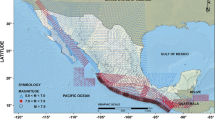Abstract
This paper describes a spatial-dynamic,stochastic optimization model that takes account ofthe complexities and dependencies of catastrophicrisks. Following a description of the general model,the paper briefly discusses a case study of earthquakerisk in the Irkutsk region of Russia. For this purposethe risk management model is customized to explicitlyincorporate the geological characteristics of theregion, as well as the seismic hazards and thevulnerability of the built environment. In its generalform, the model can analyze the interplay betweeninvestment in mitigation and risk-sharing measures. Inthe application described in this paper, the modelgenerates insurance strategies that are lessvulnerable to insolvency.
Similar content being viewed by others
References
Borch, K.: 1974, The Mathematical Theory of Insurance, Lexington Books, Lexington.
Cummins, J. D. and Doherty, N.: 1996, Can Insurers Pay for the “Big One”? Measuring Capacity of an Insurance Market to Respond to Catastrophic Losses, Wharton Risk Management and Decision Processes Center, University of Pennsylvania, W.P.
Gitis, V., Vainstock, A., Koff, G., and Karagodina, M.: 1996, Geo-Informational Technology for Evaluation of Seismic Risk and Damages from Earthquakes, Joint Report of the Institute for Information Transmission Problems and the Institute for Lithosphere (in Russian).
Gitis, V., Petrova, E., and Pirogov, S.: 1994, Catastrophic Chains, Natural Hazards 10, 117–191.
Ermoliev, Y., Ermolieva, T., MacDonald, G.,Norkin, V., and Amendola, A.: 1999, A system approach to management of catastrophic risks, Accepted for publication in the Europ. J. Operational Res.
Ermoliev, Y. and Wets, R.. (eds): 1988, Numerical Techniques for Stochastic Optimization, Springer series in Computational Mathematics, Springer-Verlag.
Ermoliev, Y., Ermolieva, T. Y., MacDonald, G., and Norkin, V.: 1998, On the design of catastrophic risk portfolios, IIASA, Interim Report IR–98–056.
Ermolieva, T. Y.: 1997, The design of optimal insurance decisions in the presence of catastrophic risks, IIASA, Interim Report IR–97–068.
Ermoliev, Y., Ermolieva, T. Y., and Norkin, V.: 1997, Spatial stochastic model for optimization capacity of insurance networks under dependent catastrophic risks: numerical experiments, IIASA, Interim Report, IR–97–028.
Ermolieva, T. Y., Ermoliev, Y., and Norkin, V.: 1997, On the role of advanced modeling in managing catastrophic risks, In: B.-M. Drottz-Sjöberg (ed.), Proc. New Risk Frontiers: Conference for the 10th Anniversary of the Society for Risk Analysis-Europe, The Center for Risk Research, Stockholm, pp. 68–74.
Insurance Service Office: 1994, The impact of catastrophes on property insurance, New York, In: H. Kunreuther (ed.), Mitigating Losses and Providing Protection Against Catastrophic Risks. The Role of Insurance and Other Policy Instruments, University of Pennsylvania, W.P. (1996).
MacDonald, G.: 1992, Persistence in Climate, JSR–91–340, The MITRE Cooperation, McLean, Virginia, 22102–3481
Pavlov O., Koff, G., and Frolova, N.: 1995, Seismic hazard and seismic risk mapping for Irkutsk City, Proc. 5th Int. Conf. on Seismic Zonation, Nice, France, pp. 1999–2019.
Pentikainen, T., Bonsdorf, H., Pesonen, M., Rantala, J., and Ruohonen, M.: 1989, Insurance Solvency and Financial Strength, Finnish Insurance Training and Publishing Company Ltd., Helsinki.
Spiegelhalter, D. J., Dawid, A. P., and Lauritzen, S. L.: 1993, Bayesian analysis in expert systems, Statistical Science.
Swiss, Re: 1997, Natural catastrophes and major losses in 1996: High losses from man-made disasters, but no extremely costly losses from natural catastrophes, Sigma 3, a journal of the Swiss Reinsurance Company.
UNDRO: 1991, Mitigating Natural Disaster: Phenomena, Effects and Options. A Manual for Policy Makers and Planners, United Nations, New York.
Walker, G. R: 1997, Current developments In: catastrophe modelling, In: N. R. Britten and J. Oliver (eds), Financial RiskManagement for Natural Catastrophes, Proceedings of a Conference sponsored by the Aon Group Australia Limited.
Author information
Authors and Affiliations
Rights and permissions
About this article
Cite this article
Amendola, A., Ermoliev, Y., Ermolieva, T.Y. et al. A Systems Approach to Modeling Catastrophic Risk and Insurability. Natural Hazards 21, 381–393 (2000). https://doi.org/10.1023/A:1008183011971
Issue Date:
DOI: https://doi.org/10.1023/A:1008183011971




